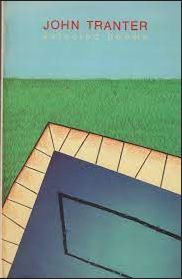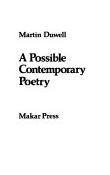- Free Article: No
- Contents Category: Poems
- Review Article: Yes
- Article Title: The Tranter Version … A Possible Contemporary Poetry
- Online Only: No
- Custom Highlight Text:
I’m a speedy reader, a rapid degutter of poems, yet it took me days to read John Tranter’s Selected Poems. This poetry is so packed with meaning, with metaphor, so inventive, intelligent, and funny it’s impossible to hurry. It left me, though I’d read most of it before, wishing for a Complete Poems to fill the gaps.
- Book 1 Title: Selected Poems
- Book 1 Biblio: Hale and Iremonger, 175 p., $19.95, $9.95 pb.,
- Book 1 Cover Small (400 x 600):
- Book 2 Title: Flowers of Emptiness.
- Book 2 Biblio: Hale and Iremonger, 112 p., $11.85 hb., $5.95 pb.
- Book 2 Cover Small (400 x 600):

- Book 3 Title: A Possible Contemporary Poetry
- Book 3 Biblio: Makar Press, 160 p., $15.95, $8.95 pb.
- Book 3 Cover Small (400 x 600):
Was it too early for Tranter to put out a Selected? I’d say, categorically, no. This is a good time to put the core of his work to date in accessible form. One cannot fully enjoy Tranter in magazine snippets, the long poem is his natural sphere. It’s interesting to see how the early work holds up, nothing of it démodé – which can easily happen in a dozen years or so with work that is merely trendy. In fact, within the poems themselves sections which, Tranter reveals, are years apart, sit together very well.
Tranter uses the long poem, not as narrative, or sequence, but as ambience, as total experience. The reader, snared already by his wit and skill, absorbs his meanings, his concerns by osmosis. Those unwilling to allow this process to take place can make mistakes, can find him cold, as does Kevin Hart, and untouched by the wry world he depicts, or, as does Andrew Taylor, decide that the poems are ‘about nothing but the psychic agility, the wit, the imaginative play that made them.’ Coolness Tranter himself admits to, and reticence, but the range and acuity of his observations posit a concern with what we’re making of this sometimes-monstrous world. There is nothing religious in his concern, which is perhaps what some critics have found wanting, and one is always conscious of the mind of the poet cool and elevated, about the mad scrabblings he depicts, making his ironic comment.
Emotional wallowings are not for Tranter, he gives us a guide to the times, a catalogue of preoccupations, he is a diagnostician rather than physician, but diagnosis is necessary and does not preclude concern.
Look at these children, walking back slowly, huddled in couples, frightened by something like a hangover
but less easily understood, an
emotion
attaching itself to their bodies, and growing
The sun rising like a deft simile,
plates their hair with fine gold also the empty bottle and the puddle of vomit,
the wet rocks, the deceitful speech of the waves
all of it, gleaming for ever.
There is a word or two there that removes it from the clinical, the cynical. Ironic – yes.
To think otherwise would make of him a monster, which concerned Jaquie Vasudeva, who in Luna asked, ‘monstrous world, monster reader?’, finally deciding to settle for his intending a deliberate strategy to involve the reader – at the level of worry, she says, the ghost beginning to haunt.
The point does not need labouring, one can quote by name poems which are overt in their concern, ‘Guernica’, ‘Butterfly’, ‘Mark’.
‘Mark’ is in a style Tranter has now bypassed, he sees it as an artificial construct – in a writer-to-reader tone he now tends to avoid, seeing it as pretence, as in reality you are talking to yourself. He continues to experiment with tone, moving from the very various sonnets of Crying in Early Infancy, enlivened with joky lines, to the heaviness of Rimbaud and the Modernist Heresy, in which he tries to come to terms with the continuing influence of Rimbaud. ‘Arthur, we needed you in ‘68’, tho’ even here he bounces off lively coruscations when things get too desolate. ‘You talk about a theft of fire, you that are/consumed and driven into dark’ he says to the poet; a very few lines later be declares ‘what a nasty shit you must have been, Sodomy! Lice!’. The poem is full of such lively changes of tone, lifelines for the reader and himself.
For sheer gaiety we have ‘Ode to Col Joye’, a morning greeting to the poets of Sydney – ‘who’s day is it, Ken Bolton’s? – it’s not like last Monday which was serious, and very/Alan Gould’: ‘Last Sunday, full of bickering relations, and not much gets done, I guess that was a Poet’s Union Day.’ This semi-catalogue, as Gwen Harwood remarked, would delight some and infuriate others.
A major preoccupation of Tranter’s poetry is poetry itself. He returns constantly to the consciousness of language as shaper of the world, of the correspondence between language and reality, and the role of poetry as one of these shaping languages. He explores these preoccupations in The Poem in Love, The Alphabet Murders, Crying in Early Infancy, Radio Traffic; in fact he’s never far from it, saying despairingly in Rimbaud ‘no book/has ever changed the destiny of stupid men,’ in Alphabet Murders, ‘poetry itself/always sorts out the poets it requires/and gives the best of them their orders.’ In Radio Traffic’s harsh noise and confusion, ‘bending an ear to the voices ... we hear more than we knew, the/end of a whole age, the glory growing into ruin.’ Though he concludes, ‘under the scattering wind I look for hints/ of a better life.’
These poems are dense, full of startling imagery, validating Tranter’s statement that he has moved from pictorial to abstract expressionism, has abandoned themes for a complex of themes, the connection between theme and expression consciously less. Of style he says in Martin Duwell’s book discussed below, ‘The way you say a thing depends on what you want to say ... You choose a form to write the poem in and away you go. But in another sense ... the poem finds its own style as it goes along.’ He declares that he has never sought to be obscure, nor to simplify, his poems are natural expressions of the way he thinks and talks.
It is impossible at this ‘length to give an adequate account/analysis of this selection, one can only advise the reader to gorge himself on its originality, verve and intelligence. In Tranter’s words
… This is architecture, friend, and masterful;
We gape to find the cathedral of words so large.
In strong contrast with John Tranter’s poetry is that of Rudi Krausmann in Flowers of Emptiness. (Both volumes beautifully produced by Hale and Iremonger. Under a ‘now’ jacket is a classic volume with handsomely lettered title page, and gold ornamented green boards.)
The poems in Flowers of Emptiness are cool, detached, sparse and pessimistic.
Most beautiful is the life that does not exist
it does not have to carry burdens
it does not have to be heroic
it is not obliged
to repeat the wanderings of Odysseus.
…
and the striving
for the absolute
as sublime
as a cathedral of banknotes
Krausmann nowhere warms into enthusiasm, though he can reveal great tenderness, as in the poem ‘Early Death, written for Jennifer Rankin, in which he grieves for ‘your early death and your voice returning ... your early death which took my breath away.’
There is a pervasive air of unreality about much of this book –
Only the scream and the news are real
and our age racing and losing so much in such a short time.
The concrete poems in, the fifth section of the book were exhibited as silk screen prints at the Hogarth Galleries, under the title Night Poems and make effective, if aphoristic statements of sadness and futility.
The last section of the book is, little more expensive. The poem which gives the book its title repeats the message of The Burial in the first section with even less hopefulness. Poetry today is ‘An exhausted/experimenting voice/a flower/of emptiness/generally ignored/ like life/and death.
These fragile, elegant poems exhale an air of insistent melancholy.
Both Tranter and Krausmann are among those interviewed in Martin Duwell’s book, A Possible Contemporary Poetry.
I find it interesting, though my reason is probably subjective, that of the poets here interviewed those who make the most lucid explanation of their poetic, who have the clearest vision of their aims are those I see as going places.
Expositions vary, self-knowledgeable, self-explanatory, defensive, revelatory, they are an interesting though not essential footnote to John Tranter’s The New Australian Poetry (1979). Thirteen of the poets in that volume appear here some of the interviews were given several years ago, as part of a series running in Makar, now unfortunately defunct. They were envisaged as a bridge between the readership of that magazine ‘reasonably intelligent, willing, but puzzled’, says Duwell, and the writer ‘at a time when there was not only a plurality of styles but profound and acrimonious disagreement about the nature and role of poetry and language’. For this reason, their emphases will appear at times to differ from what the climate of today would require, but historically this is most interesting, evincing an unexpectedly rapid change, and a considerable difference in acknowledged influences.
At this juncture the polemic in the interview is probably of less interest to the reader than discussion of working methods and influences. We all like a peep behind the scenes. I found John Tranter’s statements about the nature of his own poetry and of his idea of poetry in general most helpful in close reading of his Selected Poems.
It’s fascinating to know that John Forbes found Poems of Spirit and Action a terrific book; in fact, it’s terrific to hear a poet say he’d found stimulating the poetry he read at school.
Nigel Roberts supplies a poetic summary of his I poetic – Somehow/a poem/starts/as a projectile/ of breath/to go/to shape its. own form/& path/by what/the ear/has collected/or the heart/ put down. – Apologies for space reasons I’ve destroyed the elegant arrangement in space of this poem. Ray Desmond Jones explains, how he accommodates both violence and Buddhism.
Ley, who tells us what is what, who is compulsory and how We in Melbourne (Royal or editorial we) have inseminated and influenced poetry. Swimming on his own tide as he does Kris is largely unaware of the international connections and influences on we (in general) in Melbourne.
Maiden is modest, informative and grateful to friends and influences as is Robert Adamson.
As Martin Duwell suggests, this book is a useful tool for the consideration of the nature of the achievement of ‘The most powerful group of interacting talents in the history of poetry in Australia’.




Comments powered by CComment